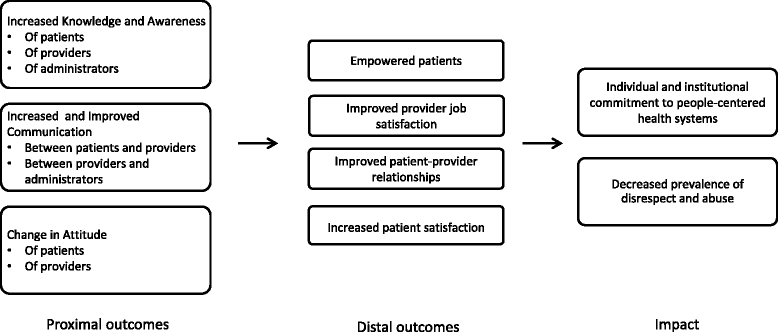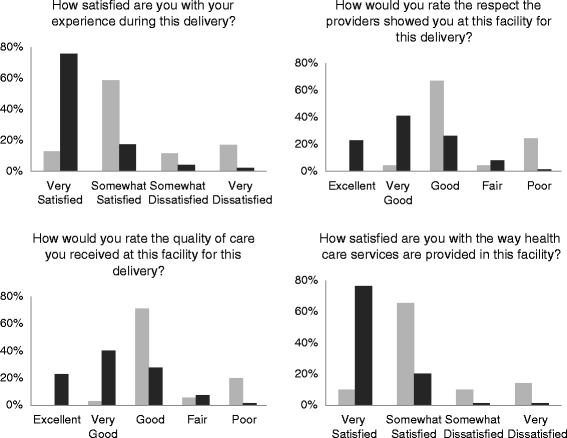Mitigating disrespect and abuse during childbirth in Tanzania: an exploratory study of the effects of two facility-based interventions in a large public hospital
- PMID: 27424608
- PMCID: PMC4948096
- DOI: 10.1186/s12978-016-0187-z
Mitigating disrespect and abuse during childbirth in Tanzania: an exploratory study of the effects of two facility-based interventions in a large public hospital
Abstract
Background: There is emerging evidence that disrespect and abuse (D&A) during facility-based childbirth is prevalent in countries throughout the world and a barrier to achieving good maternal health outcomes. However, much work remains in the identification of effective interventions to prevent and eliminate D&A during facility-based childbirth. This paper describes an exploratory study conducted in a large referral hospital in Dar es Salaam, Tanzania that sought to measure D&A, introduce a package of interventions to reduce its incidence, and evaluate their effectiveness.
Methods: After extensive consultation with critical constituencies, two discrete interventions were implemented: (1) Open Birth Days (OBD), a birth preparedness and antenatal care education program, and (2) a workshop for healthcare providers based on the Health Workers for Change curriculum. Each intervention was designed to increase knowledge of patient rights and birth preparedness; increase and improve patient-provider and provider-administrator communication; and improve women's experience and provider attitudes. The effects of the interventions were assessed using a pre-post design and a range of tools: pre-post questionnaires for OBD participants and pre-post questionnaires for workshop participants; structured interviews with healthcare providers and administrators; structured interviews with women who gave birth at the study facility; and direct observations of patient-provider interactions during labor and delivery.
Results: Comparisons before and after the interventions showed an increase in patient and provider knowledge of user rights across multiple dimensions, as well as women's knowledge of the labor and delivery process. Women reported feeling better prepared for delivery and provider attitudes towards them improved, with providers reporting higher levels of empathy for the women they serve and better interpersonal relationships. Patients and providers reported improved communication, which direct observations confirmed. Additionally, women reported feeling more empowered and confident during delivery. Provider job satisfaction increased substantially from baseline levels, as did user reports of satisfaction and perceptions of care quality.
Conclusions: Collectively, the outcomes of this study indicate that the tested interventions have the potential to be successful in promoting outcomes that are prerequisite to reducing disrespect and abuse. However, a more rigorous evaluation is needed to determine the full impact of these interventions.
Keywords: Disrespect and abuse; Health workers for change; Maternal health; Quality improvement; Quality of care; Respectful maternity care; Tanzania.
Figures
Similar articles
-
Applying a participatory approach to the promotion of a culture of respect during childbirth.Reprod Health. 2016 Jul 18;13(1):80. doi: 10.1186/s12978-016-0186-0. Reprod Health. 2016. PMID: 27424514 Free PMC article.
-
The prevalence of disrespect and abuse during facility-based childbirth in urban Tanzania.BMC Pregnancy Childbirth. 2016 Aug 19;16:236. doi: 10.1186/s12884-016-1019-4. BMC Pregnancy Childbirth. 2016. PMID: 27543002 Free PMC article.
-
Service providers' experiences of disrespectful and abusive behavior towards women during facility based childbirth in Addis Ababa, Ethiopia.Reprod Health. 2018 Jan 5;15(1):4. doi: 10.1186/s12978-017-0449-4. Reprod Health. 2018. PMID: 29304814 Free PMC article.
-
Disrespect and abuse of women during the process of childbirth at health facilities in sub-Saharan Africa: a systematic review and meta-analysis.BMC Int Health Hum Rights. 2020 Sep 7;20(1):23. doi: 10.1186/s12914-020-00242-y. BMC Int Health Hum Rights. 2020. PMID: 32894127 Free PMC article.
-
Providers' perceptions of communication and women's autonomy during childbirth: a mixed methods study in Kenya.Reprod Health. 2020 Jun 3;17(1):85. doi: 10.1186/s12978-020-0909-0. Reprod Health. 2020. PMID: 32493424 Free PMC article. Review.
Cited by
-
A systematic review of participatory approaches to empower health workers in low- and middle-income countries, highlighting Health Workers for Change.Int Health. 2023 Jul 4;15(4):462-473. doi: 10.1093/inthealth/ihac070. Int Health. 2023. PMID: 36349618 Free PMC article.
-
Organisational and individual readiness for change to respectful maternity care practice and associated factors in Ibadan, Nigeria: a cross-sectional survey.BMJ Open. 2022 Nov 22;12(11):e065517. doi: 10.1136/bmjopen-2022-065517. BMJ Open. 2022. PMID: 36414287 Free PMC article.
-
The roles of multi-component interventions in reducing mistreatment of women and enhancing respectful maternity care: a systematic review.BMC Pregnancy Childbirth. 2023 May 1;23(1):305. doi: 10.1186/s12884-023-05640-3. BMC Pregnancy Childbirth. 2023. PMID: 37127582 Free PMC article.
-
Investigating impact of consulting midwives on maternal rights charter on perception of respectful maternity care and postpartum blues among postpartum women: a quasi-experimental study.BMC Med Ethics. 2025 Jan 29;26(1):15. doi: 10.1186/s12910-025-01164-x. BMC Med Ethics. 2025. PMID: 39881329 Free PMC article.
-
Rights based approaches to sexual and reproductive health in low and middle-income countries: A systematic review.PLoS One. 2021 Apr 29;16(4):e0250976. doi: 10.1371/journal.pone.0250976. eCollection 2021. PLoS One. 2021. PMID: 33914834 Free PMC article.
References
-
- White Ribbon Alliance. Respectful Maternity Care: The Universal Rights of Childbearing Women. 2011. Available from: http://whiteribbonalliance.org/wp-content/uploads/2013/10/Final_RMC_Char.... Accessed 12 Feb 2013.
-
- Kruk ME, Paczkowski MM, Tegegn A, Tessema F, Hadley C, Asefa M, et al. Women’s preferences for obstetric care in rural Ethiopia: a population-based discrete choice experiment in a region with low rates of facility delivery. J Epidemiol Community Health. 2010;64:984–8. doi: 10.1136/jech.2009.087973. - DOI - PubMed
-
- Kujawski S, Mbaruku G, Freedman LP, Ramsey K, Moyo W, Kruk ME. Association Between Disrespect and Abuse During Childbirth and Women’s Confidence in Health Facilities in Tanzania. Matern. Child Health J. 2015;4(10):2243-250. - PubMed
-
- Bowser D, Hill K. Exploring Evidence for Disrespect and Abuse in Facility-Based Childbirth Report of a Landscape Analysis. 2010;1–57. Available from: http://www.urc-chs.com/uploads/resourceFiles/Live/RespectfulCareatBirth9...
Publication types
MeSH terms
LinkOut - more resources
Full Text Sources
Other Literature Sources
Medical



